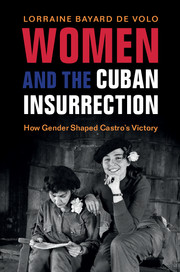Book contents
- Women and the Cuban Insurrection
- Women and the Cuban Insurrection
- Copyright page
- Dedication
- Contents
- Preface
- 1 Revolution Retold
- 2 “How Can Men Tire When Women Are Tireless?”
- 3 A Movement Is Born
- 4 Abeyance and Resurgence
- 5 Gendered Rebels
- 6 War Stories Celebrated and Silenced
- 7 “Stop the Murders of Our Children”
- 8 Masculinity and the Guerrilla War of Ideas
- 9 Women Noncombatants
- 10 Las Marianas
- 11 Past Is Prologue
- Bibliography
- Index
6 - War Stories Celebrated and Silenced: Tactical Femininity, Bombing, and Sexual Assault in the Urban Underground
Published online by Cambridge University Press: 19 January 2018
- Women and the Cuban Insurrection
- Women and the Cuban Insurrection
- Copyright page
- Dedication
- Contents
- Preface
- 1 Revolution Retold
- 2 “How Can Men Tire When Women Are Tireless?”
- 3 A Movement Is Born
- 4 Abeyance and Resurgence
- 5 Gendered Rebels
- 6 War Stories Celebrated and Silenced
- 7 “Stop the Murders of Our Children”
- 8 Masculinity and the Guerrilla War of Ideas
- 9 Women Noncombatants
- 10 Las Marianas
- 11 Past Is Prologue
- Bibliography
- Index
Summary
Marta Fuego Rodríguez, who had worked in the tobacco fields from a young age, became the sole wage earner for her family at the age of fourteen, when her father died and her mother retreated into mental illness. Several years later, in 1955, while still working, she gained admittance to a teaching college, and it was there that leaders of the university federation of teachers recruited her into M-26-7:
I transported weapons, bullets. At the time, the very wide skirts were worn, with a lot of starch. And they made bags out of thick cloth that we put on like a belt under the skirt, and inside we put weapons, bullets, documents, and also live phosphorous for the sabotage they did. [The phosphorous] we put inside a jar of facial cream, because it had to be within a liquid; if it was in the air and made contact with a spark, it would explode … We took a tube of toothpaste and would wrap a document in nylon wrap and put it inside the tube and close the tube again. If the police searched us, we would just have creams and toothpaste.
Motivated by the injustices and the inequality she observed around her, Marta was highly dedicated: “we were dying a little bit each day, and so it didn't matter to die [in the rebel underground]. And I told them I wanted to join the organization because my life was a struggle.” However, rebel men limited her contributions because she was a woman, assigning her less dangerous tasks:
I am sure they didn't see me as a comrade. They saw me as someone who could help. How could I help? Lending my house so they could sleep there, delivering a message, hiding a person in my house. They saw me in that way. But doing sabotage, transferring weapons, explosives, confronting a situation, or suffering and torture – they didn't see me that way. Confronting or murdering a guardia – no they didn't see me [doing that]. They saw me as a delicate and sweet woman.
- Type
- Chapter
- Information
- Women and the Cuban InsurrectionHow Gender Shaped Castro's Victory, pp. 114 - 143Publisher: Cambridge University PressPrint publication year: 2018



